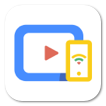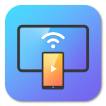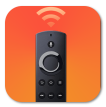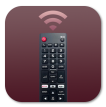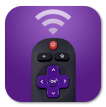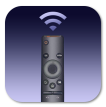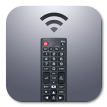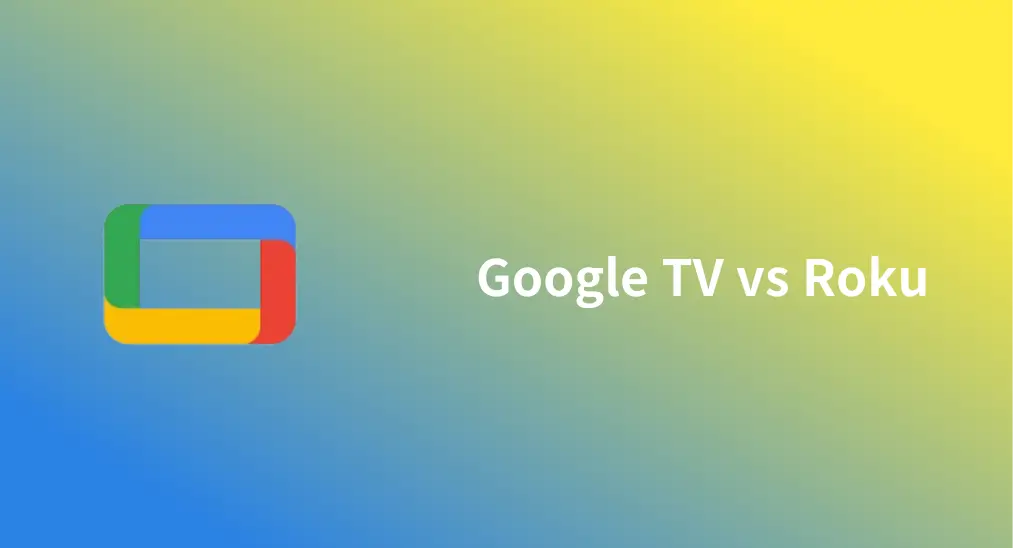
When considering Google TV vs Roku, it's essential to know your priorities: simplicity and reliability (Roku) or smart-home integration and advanced personalization (Google TV). This article explores 10 critical aspects, from display and performance to unique features (such as screen mirroring), so you can make an informed choice between Roku TV and Google TV.
Tabla de Contenido
Google TV vs Roku TV: Display & Performance
Is Google TV better than Roku? When it comes to picture and sound quality, Roku TV vs Google TV is nearly neck-and-neck on paper. Both platforms support 4K GDR formats, including Dolby Vision, HDR10, HDR10+, and Dolby Atmos audio (depending on the connected TV or sound system). This ensures rich contrast, brighter highlights, and deeper blacks, especially on premium TVs.
The Roku device, like Roku Ultra (2024), stands out with its upgraded quad-core processor and Wi-Fi 6 support, which means faster load times, quicker app switching, and better streaming stability even on congested networks. It also supports Quick Media Switching (QMS) via HDMI 2.1, eliminating the annoying black screens when changing between content with different frame rates.
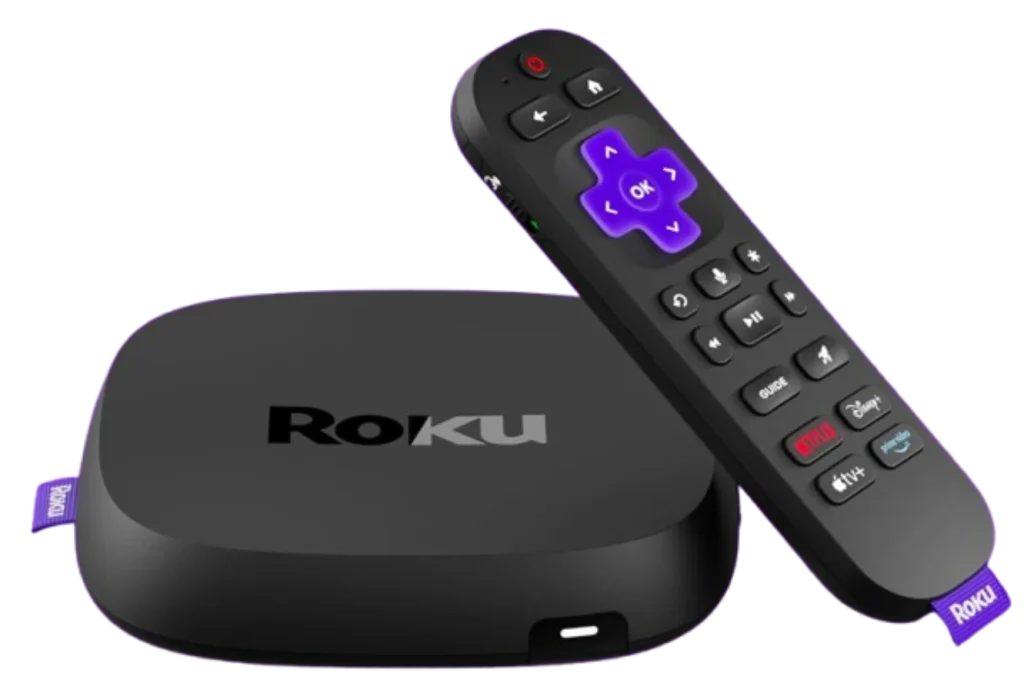
Google TV, on the other hand, is built on the more advanced and flexible Android TV 12+ OS, which scales its performance based on the hardware it's installed on. Premium Google TV streaming devices (like the latest Chromecast with Google TV 4K or NVIDIA Shield) offer smooth interface animations, faster app launching, and adaptive bitrate streaming, which adjust video quality dynamically based on your internet speed to reduce buffering.
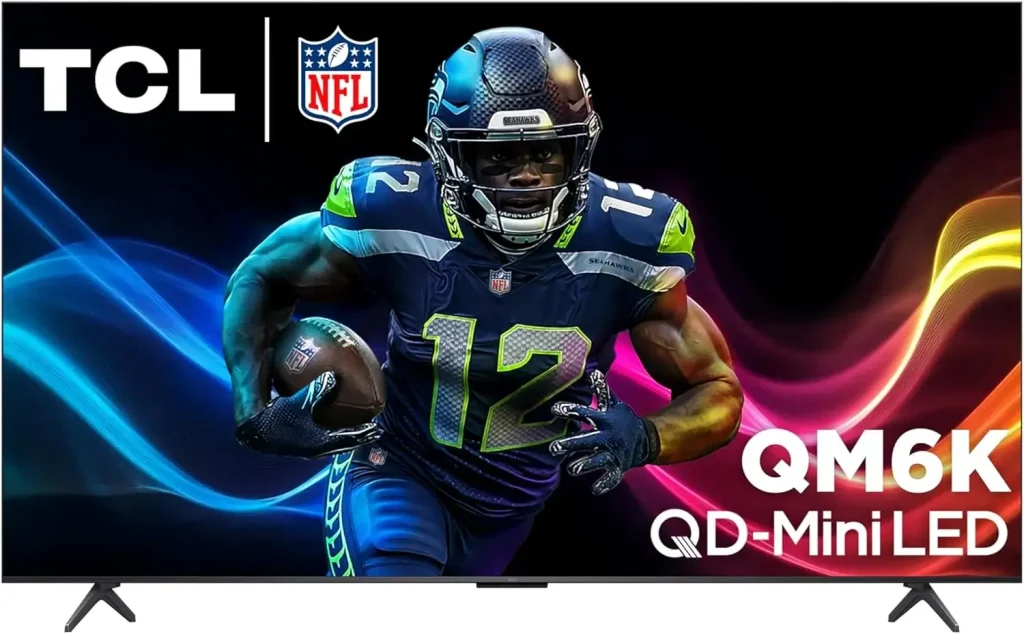
One key difference in performance lies in resource management. Roku is extremely optimized for streaming alone: there's minimal background activity, which keeps things snappy even on low-spec devices. Google TV, being more app-heavy, can experience slight slowdowns on budget models with less RAM, especially when multitasking or using Assistant voice commands.
In short, Roku excels at raw streaming speed and low system overhead, ideal for plug-and-play users who just want content fast; Google TV brings rich visuals and smooth performance on higher-end hardware, especially when using features like live previews, multitasking, and smart recommendations.
Google TV vs Roku TV: Ease of Use
In the Google vs Roku TV battle for simplicity, Roku opts for a straightforward grid interface, large icons, and a remote that's intuitive from the first use, ideal for users who prefer one-click access to apps. There's no bloat, and no overwhelming suggestions or side menus.
Google TV offers a richer front end centered around recommendations, voice searches, and dynamic content rows. It may appeal to those who love exploring or using smart voice features, but it can feel layered and slightly more complex to newcomers.
Both systems support voice input, but Roku's long-press mic on the remote offers instant search, while Google TV benefits from full assistant integration, allowing users to adjust settings, ask questions, or even control lights without leaving the screen.
Google TV vs Roku TV: Personalization & Content Discovery
One of the biggest differences in the Google Smart TV vs Roku debate lies in how each platform helps users discover what to watch next.
Google TV is built around personalization. For the moment you log in, it syncs your watch history, subscriptions, and even Google search activity (if enabled) to tailor its recommendations. The home screen is populated with genre-based rows like "Because you watched..." or "Continue watching", pulling content from across your installed streaming services, not just one app.
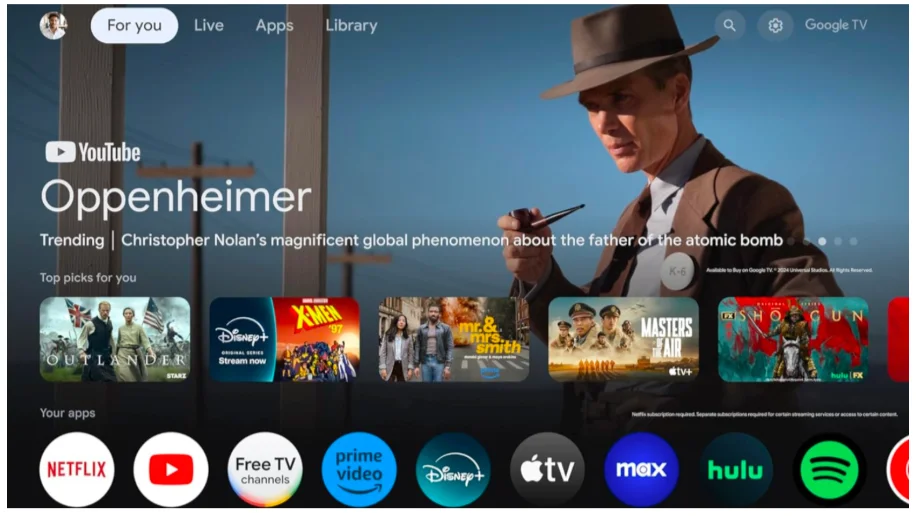
Google also includes AI-driven content summaries and ratings, powered by Google's broader ecosystem. For example, hovering over a title can reveal cast highlights, critic reviews, trailers, and direct Rotten Tomatoes ratings, and these are all in one place.
Roku doesn't chase hyper-personalization the way Google TV does, and honestly, that's part of its charm. Instead of layering the home screen with recommendations and cross-app previews, Roku keeps things direct: your Roku apps are front and center, and you decide where to go. Want Netflix? You click it. Done.
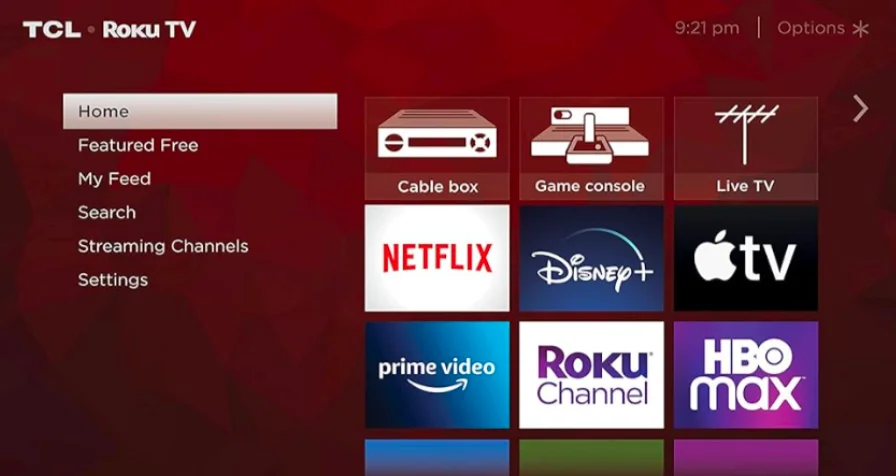
Sure, Roku has its What to Watch section, but it doesn't learn your tastes the same way Google TV tries to. That might sound like a downside, but for some people, it's exactly the experience they want: less noise, fewer distractions, and no algorithms trying to guess what you're in the mood for.
Roku's content discovery feels more like browsing shelves at a video store, and you're in control, not the software.
Google TV vs Roku TV: App Selection & Compatibility
This is where the platforms start to diverge in a meaningful way.
Google TV has the advantage of being built on Android TV, which means you're tapping into a massive app ecosystem. Whether it's regional streaming services, niche sports apps, file managers, VPNs, or even emulators—chances are, if it runs on Android, you can get it on Google TV. And if not? You can sideload the app, assuming you're comfortable digging into settings.
Roku, by contrast, offers a curated app store—what it calls "Channels" (check Mejores canales de Roku). It's simple, safe, and 99% of people won't feel like anything is missing. You've got Netflix, Prime, YouTube, Hulu, Apple TV+, and dozens more. But for those who like tinkering or want access to lesser-known services, Roku can feel a little walled off. There's no sideloading (but Canales ocultos de Roku are available), and it's clear Roku wants to keep the experience controlled and consistent.
If you're the kind of viewer who sticks to the big platforms, you'll be perfectly happy with either. But if you want more flexibility, Google TV's app support goes deeper.
Google TV vs Roku TV: Voice Control & Smart Features
This one's simple: Google TV is smarter.
Google TV's voice control isn't just for searching shows. You can ask about the weather, dim the lights, play your security camera feed, or control your thermostat—assuming your smart home runs on Google. It's a natural extension of the Google Assistant experience, and for people already in the Google ecosystem, it's seamless.
Roku does support voice search, and it's decent for finding titles or launching apps. You can say things like "Play The Bear on Hulu" or "Launch YouTube." But it doesn't go beyond that unless you're pairing with Alexa or Siri through third-party devices. Even then, the integration is limited to basic commands.
So, if you're looking for something that works more like a home assistant hub, Google TV is the clear winner. Roku plays nice, but it's not built for full smart-home control.
Google TV vs Roku TV: Screen Mirroring & Casting
When it comes to sharing content from your phone or laptop to your TV, Google TV and Roku TV offer different strengths.
Google TV gives you built-in Chromecast, which works flawlessly with Android phones, Google Photos, Chrome browsers, and most major streaming apps. Casting is fast and reliable. You just need to tap the icon, and the content pops up on your screen. It also supports full screen mirroring for Android dispositivos.
Roku counters with Apple AirPlay 2 and screen mirroring via Miracast, which works well for iPhones, iPads, and even Windows laptops. That makes Roku surprisingly flexible, especially if you live in an Apple-heavy household. But when it comes to multi-platform compatibility and ease of use, Chromecast still feels more polished and universally supported.
That said, casting across platforms isn't always as smooth as it sounds, especially if you're trying to stream from Android to Roku, or from iOS to a non-Apple TV. Each ecosystem tends to favor its own devices, which can be limiting.
Consejo: Want to mirror or cast from your phone to almost any smart TV? The third-party Duplicación de Pantalla app (available on both Android and iOS) makes it easy to stream photos, videos, or entire screens directly to TVs like Samsung, Sony, Hisense, LG, Roku, and more, without needing matching ecosystems. It's a handy workaround when native casting falls short.
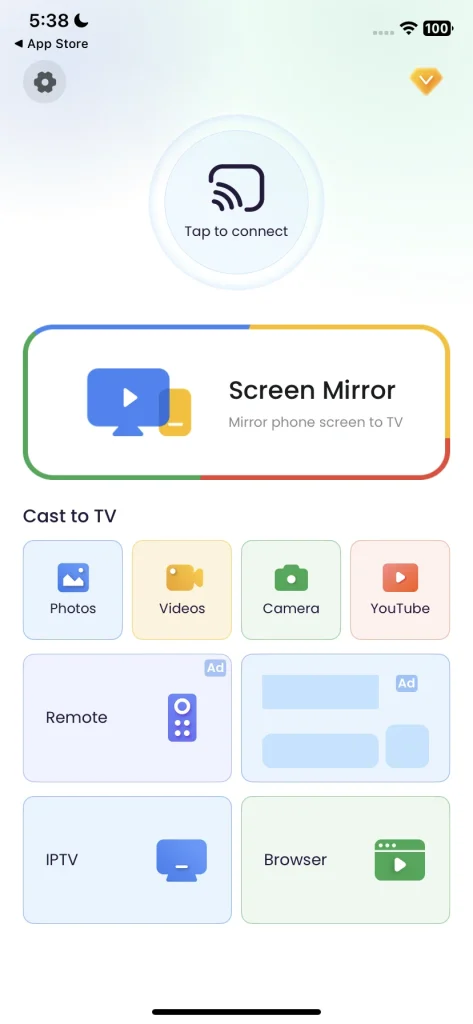
Descarga la Aplicación de Duplicación de Pantalla
Google TV vs Roku TV: Device & Remote Design
Design might not be the first thing you think of when evaluating Google vs Roku TV, but when you use the remote every day, it starts to matter.
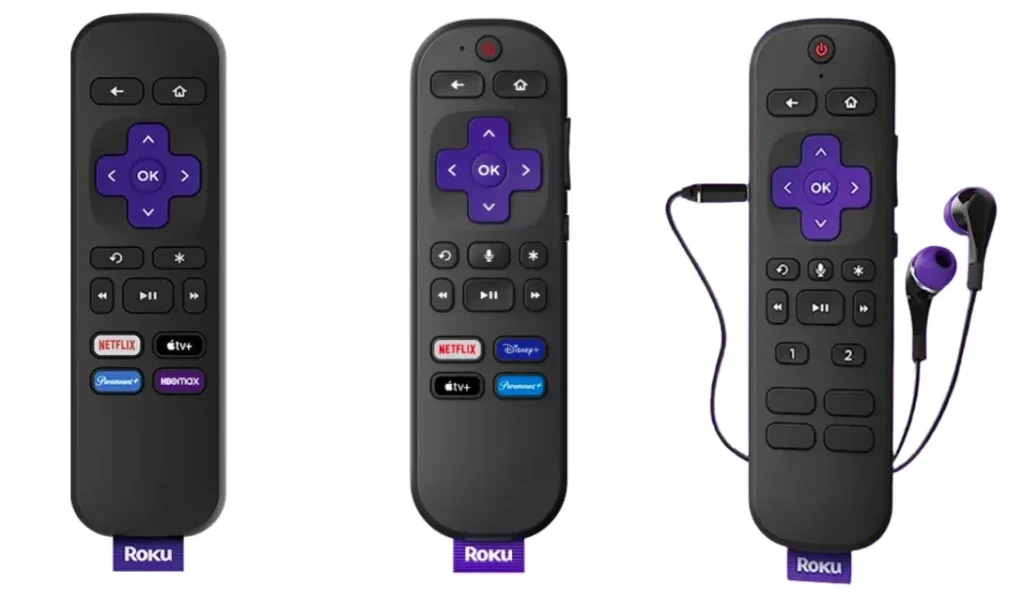
Roku remotes are famously simple. They're compact, ergonomic, and built with usability in mind. The layout hasn't changed much over the years, for good reason. You get big, clearly labeled buttons, a directional pad, and four app shortcuts (usually to Netflix, Disney+, etc.). Voice-enabled models add a microphone button, and the higher-end Roku Voice Remote Pro even includes a built-in rechargeable battery and a "lost remote" finder.
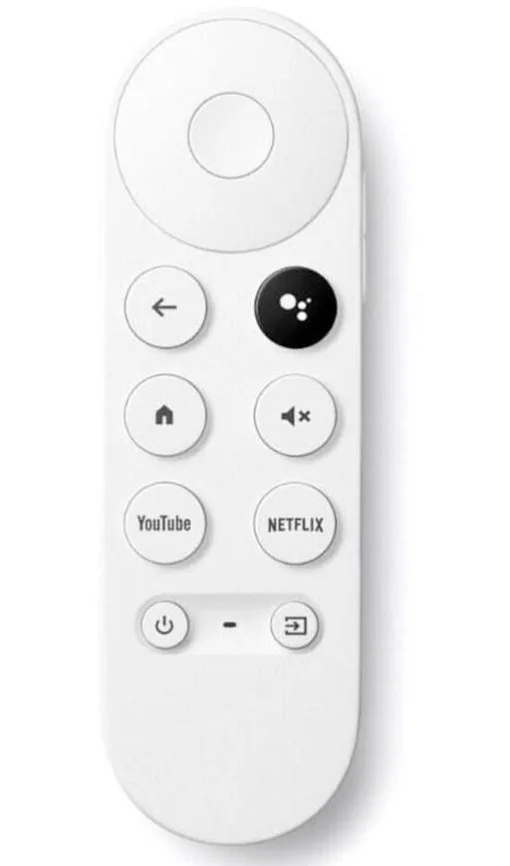
Google TV remotes vary a bit more depending on the device. The Chromecast with Google TV remote is minimalist and sleek, with a round navigation pad, customizable app buttons, and a Google Assistant mic that lets you speak naturally into the remote. It feels more modern and a bit more premium—though not as intuitive for those who just want physical buttons and no frills.
If you're a fan of clean, smart design, Google's remote wins on looks and Assistant integration. If you want a straightforward, familiar tool with fewer distractions, Roku's remote might be your pick.
Google TV vs Roku TV: Software Updates & Tech Support
Roku's strength is in stability. The company rolls out updates quietly in the background, with minimal changes to the interface. Devices as old as 5–6 years ago still receive firmware updates and security patches, which is great for longevity. If you like things to "just work" for years without changing too much, Roku has a strong track record here.
Google TV, being based on Android TV, gets more frequent and sometimes more dramatic updates. That means more features, smarter AI integration, and evolving UI improvements, but it can also mean changes that take time to get used to. Support also depends on the hardware manufacturer. For example, Chromecast with Google TV and NVIDIA Shield get frequent updates, while some cheap third-party Google TVs may lag behind.
In short, Roku offers consistency and long support for budget and midrange devices. Google TV offers cutting-edge features, but update quality can vary depending on your device.
Google TV vs Roku TV: Ads & Data Collection
Here's something that doesn't get talked about enough: both Roku and Google TV collect data and they both show ads.
Roku's home screen has started to feel more commercial in recent years. You'll see sponsored movie placements, banners, and autoplaying tiles. It's not aggressive, but it's noticeable, and there's no ad-free option.
Google TV is a bit more subtle. Ads are blended into recommendation rows ("Suggested for you", "Trending Now"), but they're still ads. And since Google is a data company at its core, it's no surprise that its recommendations are fueled by everything from your YouTube history to your search activity if you've opted in.
If privacy is your top concern, you're really choosing the lesser of two data collectors. Roku tracks less deeply but shows more obvious promotions. Google offers more tailored suggestions but gathers more data in the process.
Google TV vs Roku TV: Price & Value
Choose Google TV streamer vs Roku Ultra? Let's break it down by common device categories in terms of price:
| Category | Roku TV | Google TV |
| Budget (Under $50) | Roku Express / Express 4K | Chromecast con Google TV HD |
| Midrange ($50–100) | Roku Streaming Stick 4K+ | Chromecast con Google TV 4K |
| Premium ($100+) | Roku Ultra | NVIDIA Shield TV / Pro |
- Budget tier: Roku often undercuts Google slightly in price. The Roku Express 4K offers excellent performance for the price. However, Chromecast with Google TV HD gives you access to Assistant and casting, which Roku lacks.
- Midrange: Both platforms shine here. Roku's Streaming Stick 4K+ is fast, with great Wi-Fi and Dolby Vision. Google TV 4K offers a better interface, smarter recommendations, and casting.
- Premium: Roku Ultra is great for power users who want Ethernet, a lost remote finder, and QMS support. But if you want real performance muscle, NVIDIA Shield Pro (running Google TV) is in a league of its own—with AI upscaling, Plex server capabilities, and high-end gaming support.
When it comes to value, Roku wins for most casual viewers and budget shoppers, while Google TV becomes a better deal the more you take advantage of its smart features.
Should You Get Roku TV or Google TV?
Roku vs Google TV? Here's a straightforward breakdown based on real-world usage:
Choose Roku TV If You:
- Want something simple, stable, and fast
- Don't care about smart home features
- Prefer navigating by app instead of recommendation
- Value consistency and long-term support
- Are buying for older family members or tech-averse users
Choose Google TV If You:
- Already use Google Assistant or other Google services
- Like content suggestions and dynamic UI
- Want to cast easily from your Android phone or browser
- Enjoy exploring new apps and features
- Prefer a future-facing, smart-home-ready experience
Veredicto Final
There's no universal winner here, just the right fit for different needs. Roku TV is like your favorite paperback novel: reliable, straightforward, and easy to come back to. Google TV is more like a digital magazine: interactive, full of dynamic content, and deeply personalized.
For the minimalist, Roku wins. For the tech-savvy, Google TV takes the crown.
Google TV vs Roku FAQs
Q: What's better, Google TV or Roku TV?
It depends on what you value. If you want simplicity, speed, and minimal setup, Roku is often the better pick. If you prefer deep personalization, voice integration, and smart home features, Google TV has the upper hand, especially on higher-end hardware.
Q: What are the disadvantages of Google TV?
- Slightly steeper learning curve
- Can feel cluttered with recommendations and dynamic content
- Performance may lag on budget devices
- Heavier data collection compared to Roku
Q: Does Google TV have free channels like Roku?
Yes, but not in the same way. Google TV aggregates free content from services like Tubi, Pluto TV, and YouTube, and recently introduced its own Free Live TV tab. However, Roku's Live TV Zone and Roku Channel offer more centralized access to free streaming content out of the box.
Q: Is it worth it to buy Google TV?
Absolutely, if you use Google services, value smart recommendations, or want casting and voice control baked in. It's a great platform for tech-savvy users and anyone already in the Google ecosystem.
Q: Is there a monthly fee for Google TV?
No, Google TV itself is free to use. You only pay for streaming services (like Netflix, Hulu, etc.). The platform is ad-supported, but there are no hidden subscription fees to access its interface or features.
Q: What is the point of Google TV?
Google TV aims to simplify your viewing by organizing content from across apps in one place, offering personalized recommendations, voice control via Google Assistant, and integration with smart home devices. Think of it as a smart content layer over your streaming services.
Q: Can I use a Roku on a Google TV?
Yes. You can plug a Roku streaming device (like a Roku Stick or Ultra) into a TV that runs Google TV via an HDMI port. In this case, you'll just switch inputs between the Roku and the Google TV interface, essentially using the Roku as a separate streaming box.
